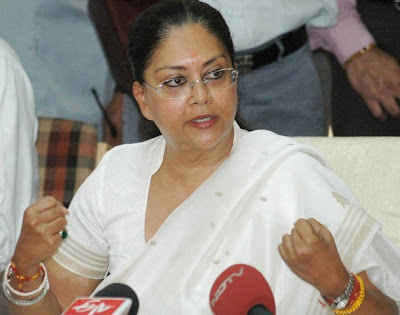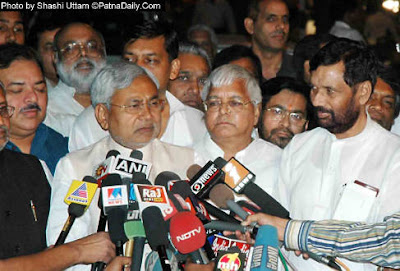 The failure of the BJP to notch up a victory in Delhi has started a lively political debate in India regarding the electoral marketability of the "issue" of terrorism. Some have argued that, much like that of Madrid train bombings of 2004, the impact of the Mumbai terrorist attack of 26/11 on Indian voters has been transformational. It has been suggested that terrorism has been elevated to a "national issue", which is an euphemistic way of saying that the people of India refuse to see it any longer as a communal issue and refuse to believe any particular political party is any more serious about dealing with it than any other.
The failure of the BJP to notch up a victory in Delhi has started a lively political debate in India regarding the electoral marketability of the "issue" of terrorism. Some have argued that, much like that of Madrid train bombings of 2004, the impact of the Mumbai terrorist attack of 26/11 on Indian voters has been transformational. It has been suggested that terrorism has been elevated to a "national issue", which is an euphemistic way of saying that the people of India refuse to see it any longer as a communal issue and refuse to believe any particular political party is any more serious about dealing with it than any other.This pipe dream of the English language press has been played up no end, with newspaper after newspaper effectively congratulating the voters of Delhi for rejecting the "communal" BJP in favour of the secular Congress. The message was so shrill that a version of this was picked up by the BBC and the Associated Press, but not before the Indian liberals had carefully inserted the words "Hindu Nationalist" before the BJP and had made sure to remind the world that the Congress was "the party of Mahatma Gandhi". One wonders why no newspaper ever reminds African Americans that the Republican Party is "the party of Abraham Lincoln".
Back home, the Oracle opines that this might be a case of reading too much into a small state election. Delhi, after all, is the smallest of the four heartland states that went to elections and the personal popularity of Sheila Dikshit, her focus on state issues and the highly informed electorate of Delhi (which can discern State and Central government powers/concerns very easily) played a huge part in the outcome. The BJP certainly has reasons to worry, after whittling away a healthy pre-election lead; and then losing dismally in the immediate aftermath of a "spectacular" terrorist attack.
But not too many! If you look carefully at the electoral history of India, you will notice that major events have, of themselves, rarely proved to change public opinion overnight. What one needs is time... time for a political party to build a political campaign around the event. In the case of Delhi, this is precisely what the BJP lacked... enough time to make political capital over the Mumbai terrorist attacks. A simple example of this phenomenon would be the following: the burning of the Sabarmati express did not have an immediate effect on electoral outcomes in Gujarat. In fact, the Congress won handsomely in several small, local elections held after the Godhra incident, leading at least one senior Congress leader to say smugly: The Congress has swept all the elections in Gujarat pre-Godhra and post-Godhra. If Narendrabhai had not crisscrossed Gujarat on his Gaurav Yatra, or if VHP cadres had not campaigned in the tribal areas of Gujarat wearing tee-shirts with the message "क्या आप गोधरा को भूल सकते हैं ?", the outcome might well have been different. Kandhmahal would be another case in point, where the BJP made very little impact in local body elections despite the highly publicized communally charged situation on the ground. Again, the BJP hardly campaigned in Kandhmahal on the issue of Hindutva.
The lesson for the BJP is that it cannot hope to benefit from any communally charged situation unless it actually campaigns on the issue. As far as Delhi is concerned, the BJP never had the time to work the issue into the campaign. A last minute advertisement in the newspapers does not count as a campaign and it gives ammunition to BJP bashers in the media. Compare this to the situation in Jammu, where the BJP's performance was stellar. There the BJP had time to convert the groundswell of public anger into votes, by means of an effective campaign. At one point, the BJP was leading in 17 seats, a score that shrank to 11 (which is still a gain of 10 seats!!), probably due to widespread public realization that, of the 4 parties: Congress, PDP, NC and BJP, the BJP alone has no chance at power at all. Nevertheless, Ghulam Nabi Azad's statement that the BJP's gains are "worrisome" is extremely reprehensible. The connotation that the BJP is somehow anti-national is reprehensible and rather ironic, particuarly because the Congress party declared that it was open to tie up with a party that was both "secular" and "nationalist". The PDP does not make the grade as either "secular" or "nationalist" and the Congress should know that. Apart from that, the Congress should be reminded of its seat sharing arrangement with the Muslim League (IUML) in Kerala. Of course, Ghulam Nabi toned down his remark later on to say that "BJP has won but Jammu has lost, because the BJP will never make it to power". Yet, the act of an elected leader thus belittling the verdict of the people as well as the accompanying admission that the new Government of J&K intends to punish the Jammu region is despicable.
The issue of terrorism remains at the heart of the Indian election. The media should stop insulting the intelligence of the people by suggesting that the masses are being somehow anti-national by linking Islam to terrorism. For what it's worth, people will never stop linking Islam to terrorism, nor Walt Disney to Mickey Mouse. However, the BJP must admit that the "old Hindutva" package has outlasted its utility. No longer do the people of India respond emotionally to the building of a temple in Ayodhya, Bhojshala or in Chikmanglur. People want peace and progress and terrorism threatens both of these aims. It is not very wise to think that people will not respond positively to a message that aims to deal with terrorism with a heavy hand.
However, in order to make the issue of terrorism more effective, the BJP needs a better public relations campaign. The party knows that it is not a favourite of the English language media and has not taken sincere steps to remedy the situation. The party's campaign managers have also been ineffective in sending out certain messages to the people. For instance, the BJP often comes under fire for having let out Masood Azhar during the Kandahar crisis. The Congress has been given a free hand by the media to twist the story so far out of shape that now it usually reads like as though the BJP Government eagerly surrendered to the terrorists, not with 189 Indian lives hanging in the balance. To my knowledge, the BJP has never mounted an offensive campaign to compare and contrast this with the shameful surrender of Indian national interests to the personal interests of Rubaiyya Sayeed in 1989. Instead, Advani has cowered, sinking to the extent of suggesting that he was not even part of the decision to release Masood Azhar. The BJP must learn to fight the media battle, or else, as the Delhi verdict showed, one does not always have enough time to hit the streets and campaign. The Congress instead, had the luxury of their campaign message being beamed directly into the living rooms of the city, without having to put a foot on the ground.
So, what have we learned? We summarize as follows:
a. The "old Hindutva" is dead: Construction of temples, etc. is no longer a major issue. Public discourse has moved beyond that.
b. "Hindutva" needs to be repackaged as anger against Islamic terrorism in order to make an impact. This is because terrorism threatens the promise of a rising India.
c. There is no automatic route from "communal incidents" to electoral victory: A lot of energy has to go into the campaign, before an issue can be translated into votes.
d. For "Hindutva" to be effective, the atmosphere must be conducive and the campaign effective: Kalyan Singh tried to evoke Hindutva out of nowhere in Uttar Pradesh in 2007 and it resulted in nothing but disappointment. Hindutva must be accompanied with a strong commitment to development, with Hindutva justified by the necessity to do "all it takes" to remove obstacles to progress. It's the idea of "Hindutva+". In Gujarat, they call it "Moditva".
e. The BJP needs to have better relations with the English language media. A crop of argumentative, English speaking leaders who can dictate the airwaves would be a pleasant change. There is nothing like the luxury of having the media campaign for you, for free.













